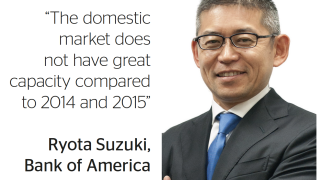Yen
-
The Republic of the Philippines took advantage of Japanese investors’ hunger for yield with a tightly priced four-tranche ¥92bn ($863.4m) Samurai bond.
-
The state of Israel returned to the yen market for the first time in 18 years this week to raise ¥15bn ($140m) of seven year debt. The private placement marks the state’s third visit to the capital markets in 2019 and its first non-euro trade of the year.
-
India’s plan to sell its first international bond has been caught in a battle of wills between the ministry of finance and the government. While any issuance is likely to be received well by the market, the sovereign should hold off on a deal until it is ready to present a united front to investors.
-
Caisse des Dépôts et Consignations has returned to the Samurai market with what the issuer and leads said was the lowest ever coupon in the format.
-
Mexico showed that it still has full access to its regular funding markets this week as Japanese investors gave the sovereign its largest ever order book in the Samurai market, on the way to its largest deal in the currency.
-
The Republic of Indonesia raised ¥177bn ($1.6bn) from a six tranche bond sale in Japanese yen on Thursday, making it the largest public Samurai bond deal from an Asian country.
-
The yen bond market, for all its vibrancy, cannot contain Japan’s ambitious issuers. Banks and corporates are building on efforts to woo dollar and euro investors as they thirst for new sources of funding, writes Morgan Davis
-
Malaysia has closed the biggest sovereign Samurai bond in 18 years, raising ¥200bn ($1.79bn) from what could be just the first of many such deals to come.
-
Power Grid Corporation of India has broken a seven-year absence from the international loan market to target Japanese liquidity for a ¥22bn ($201m) Samurai deal.
-
Korea National Oil Corp’s debut in the Japanese yen market on Wednesday was one to remember. The deal was the largest single-tranche Samurai bond on record in Asia, despite a rise in tensions between the two countries.
-
Housing Development Finance Corp is taking the Samurai loan route for its second syndicated financing of the year.
-
CPI Property, which owns real estate in Berlin and central and eastern Europe, entered Tokyo’s Pro-Bond market on Friday, raising ¥11bn ($97m) across three and 10 years tranches.









